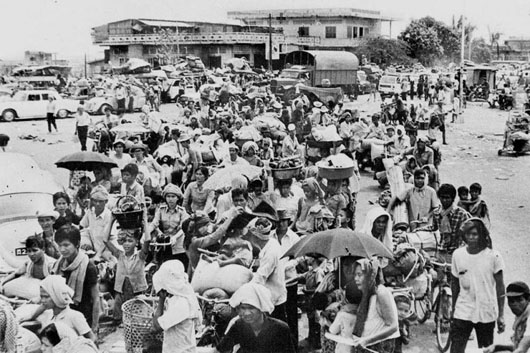by WorldTribune Staff, March 1, 2018
A man who spent nine months with the Khmer Rouge in the early 1970s has come forward to recount his story of what life was like under the brutal communists who carried out the Cambodian genocide.
Ith Sarin, now age 80, said he has returned to Cambodia from the U.S. to live out his final years.

“I am near my grave now so I don’t want to look back to painful experience or badmouth anyone,” Sarin told The Phnom Penh Post. “I just want to spend my last years in peace.”
Shortly after he left the Khmer Rouge in 1973, Sarin’s book, Sronos Proleung Khmer (Regretting Khmer Souls), was published.
“The book is claimed by scholars and historians to be the first written record from inside the Khmer Rouge, and the only [one] to be published before the brutal arrival of Year Zero. The writing reveals the movement’s fierce stance against Prince Norodom Sihanouk, not just the Lon Nol regime, and its penchant for violence,” the Phnom Penh Post report said.
“I wrote the book because I hoped it would prevent the country from falling into communism, but it failed,” Sarin said. “About 30 percent of my life is still empty.”
Up to 2 million people were killed by the communist Khmer Rouge.
After the Khmer Rouge took power in Cambodia, “there was speculation about Sarin’s death,” the report said. “Some said he was killed in a Democratic Kampuchea security center, as revenge for defecting from them, while others said he died while trying to flee the country. Those who learned that he went to the U.S. claimed he died there from disease. But Sarin is still alive today and ready to tell his story one last time.”
Sarin said, during his time with the Khmer Rouge, he witnessed their atrocities and “unreasonable ferocity, both on their enemies and the innocent.”
“I heard some of them bragging about killing Lon Nol’s soldiers’ wives and even children, saying that they are enemies,” Sarin said. “They also killed a group of teachers and scholars, whom they accuse of being ‘the third force’, or those who worked to unite both conflicting parties.”
Sarin said he was disappointed by Lon Nol’s inability to rule the country wisely, and to restrain the spread of communism.
“There is nothing I hate more than communism,” he said. “But, like many educators at that time, I was a progressive, who wants positive reforms for his country, especially unity among people.”
Sarin said communism had already reached “the liver” of the Lon Nol government when, in April 1972, he decided to leave his job to join the National United Front of Kampuchea, an anti-Lon Nol movement that joined forces with the Khmer Rouge.
“At that time, many officials under Lon Nol joined the Khmer Rouge,” he said.
Initially, Sarin said he was impressed by the communists, many of whom had been educated in Western countries, but he was put off by the group’s peasant way of life and long list of rules that they required to be strictly followed.
As time passed, Sarin said his admiration soured.
“His freedom to wander, to say what he wanted, and even to keep his own name, was taken away,” the report said. “It didn’t take him long to realize the Khmer Rouge were more a group of ultra-Maoists who hated Sihanouk than a loyal force supporting him.”
After leaving the Khmer Rouge, Sarin said for nearly four years he moved from place to place and used fake names. He eventually fled to a refugee camp. In 1982, some of his American friends helped him get to the U.S., where he lived until five years ago, when Sarin decided he wanted to return home for his golden years.
Subscribe to Geostrategy-Direct __________ Support Free Press Foundation
